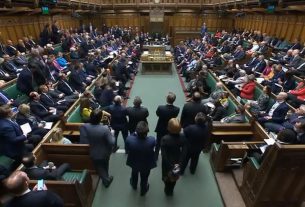Sir Keir Starmer has pledged to resign if he’s fined by Durham police for beers and curry – a stance being covered as a ‘high-stakes-high-reward gamble’. The Labour leader is framed as trying to draw a clear distinction between himself and Boris Johnson, who faces more fines for more lockdown breaches – and eventually the full publication of Sue Gray’s report.
“I believe in honour, integrity and the principle that those who make the laws must follow them,” Starmer said today (May 9). “I’m very different to the prime minister in this regard,” he continued. “He [Johnson] and others in his party want us to believe that [politicians] are all the same . . . I’m here to show you that is not the case.”
The knight of the realm assured the nation he will fall on his sword should Durham police issue him a fixed penalty notice sending political pundits, commentators and columnists into a frenzy of analysis and crystal-ball gazing.
The Independent’s associate editor Sean O’Grady argues that Starmer’s survival would actually be “a bad outcome for the [Labour] party”.
Deputy leader Angela Rayner said she will also quit if fined by police and O’Grady asks if “someone such as Lisa Nandy or Wes Streeting” might be better for Labour because “mud sticks” and “Starmer will never recover from Beergate, even if he is proven ‘innocent’.” O’Grady points to “how few Tories are calling for him to resign.” Not just because of the pressure it would put on Johnson, but also because the Labour leader would be “damaged goods, limping his way to the next election”.
To underline the point, O’Grady adds: “No wonder Jacob Rees-Mogg is calling for a truce”.
‘Serious consequences, whatever the outcome’
The Times’ analysis says Starmer “has taken the biggest gamble of his leadership” and Rupert Murdoch’s broadsheet states: “If Starmer is fined for breaking lockdown rules, he will almost certainly have to quit. So why not make a virtue of this brute political truth?”
It adds that the “ideal scenario” for the Labour leader, according to the Times, is for Durham police to “conclude that he is telling the truth and that no rules were broken”. This would alllow Starmer to “claim vindication and draw a clear contrast” with the prime minister who “would certainly continue to cling on” putting “Tory MPs in an even more invidious position.”
The Guardian claims Labour has evidence – including “time stamped logs of WhatsApp chats, documents and video edits” – to prove the beers and curry at the centre of the furore were permitted under lockdown restrictions.
Rowena Mason, the Guardian’s deputy political editor calls Starmer’s “moment of intense drama” an “unexpected gamble”.
“It will have serious consequences, whatever the outcome of the investigation,” writes Mason. These will be largely for Johnson given the clear distinction being drawn, but Starmer too “if Durham police fudge their findings, as they did with former No 10 aide Dominic Cummings.”
Starmer would then “come under pressure to abide by the spirit of his statement”. This would please many in his own party, “both those wishing for a more charismatic leader – perhaps Wes Streeting or Lisa Nandy – and those who resent his decision to move Labour’s policies away from the Corbyn era.”
Jim Waterson, the Guardian’s media editor, reports the “potentially career-ending video” of Starmer drinking a beer “was filmed by Ivo Delingpole, the student son of the Breitbart writer James Delingpole”, adding yet another layer of intrigue on the story.
Robert Shrimsley, in the Financial Times’ Instant Insight piece says the pledge could be the making of Starmer, whose position would have been “untenable” had he been fined and stayed on.
“He would be the former Director of Public Prosecutions, the self-proclaimed hard man on law and order, who himself broke the law. The risks are therefore not as great as they might appear,” writes Shrimsley, adding: “And the potential gains are huge.”
How far the public will be swayed by such opinions and analysis as those outlined above can never fully be ascertained, though the Financial Time reports that pollster YouGov has found that 48% of Britons think Starmer should go if he is fined but only 30% believe he has broken lockdown laws.
‘Scheming’ Starmer diagnosed with ‘Sunakism’
The Telegraph’s take is that “scheming” Starmer has tried to “turn the tables” on Johnson and “plots to manipulate the crisis”, detailing the Labour’s leader weekend after they had published the story on Friday confirming the police investigation.
For Johnson’s former employers at the Telegraph, Starmer’s “decision to place his career in the hands of Durham police could also prompt a slew of more revelations from those who want to see him forced from office.”
They even manage a dig at the chancellor RIshi Sunak, saying some have diagnosed “Sir Keir with ‘Sunakism’ – comparing his failure to recognise the seriousness of the “beergate” allegations to Rishi Sunak’s ostrich-like approach to news of his wife’s tax affairs.”
Associate editor of the Telegraph, Camilla Tominey calls Starmer “desperate” and dismissed the statement by “the self-styled High Priest of Politics” as the Labour leader playing “Mother Theresa to Boris Johnson’s Father Ted.”
Starmer “betrayed his lack of understanding of the British public” who have long been cynical of politicians. Tominey added: “In stark contrast to the Prime Minister’s repeated repentance over “partygate”, here was a former director of public prosecutions trying to maintain there was no case to answer in the first place, m’lud. Why apologise when there is nothing to apologise for?”
It is a similar tone to that of historian, columnist and Telegraph leader writer, Tim Stanley, who laments: “Oh for a politician who says ‘yes, I did break lockdown rules, but I’m not going to resign because they were stupid!’”
Stanley opines “the cavalier spirit is dead; this is the age of the puritan” casting “Goody Starmer” as the “vicar of Holborn” in a piece that concludes the whole Party-cum-beergate affair is “all so unnecessary. Covid was a nightmare; most of us would like to forget it and move on.”
Unfortunately, that is not so easy for the families of the many thousands who died from Covid. Or indeed for those who believe honesty, honour and integrity still matter. For such as them, it’s not and never havs been about cake, beer or curry. So it’s a strange occurrence but very reflective of the times, and even more so the Telegraph, that a historian wants to forget a pandemic that caused the world to lockdown, and simply “move on”.




